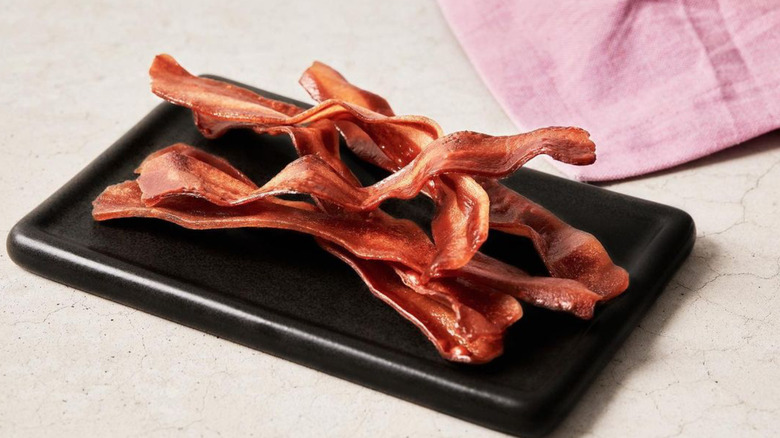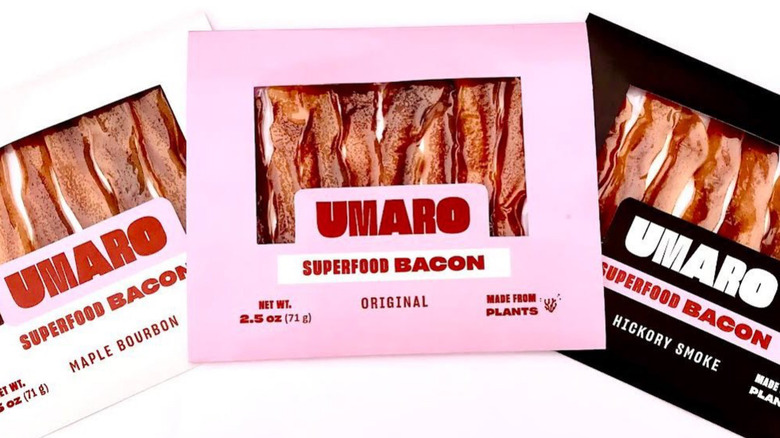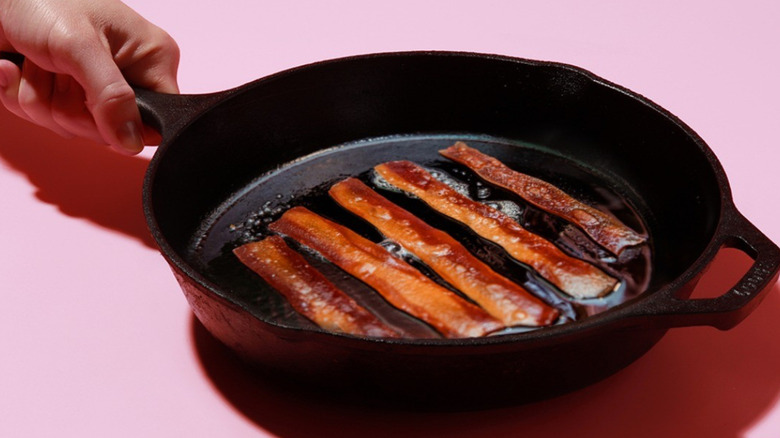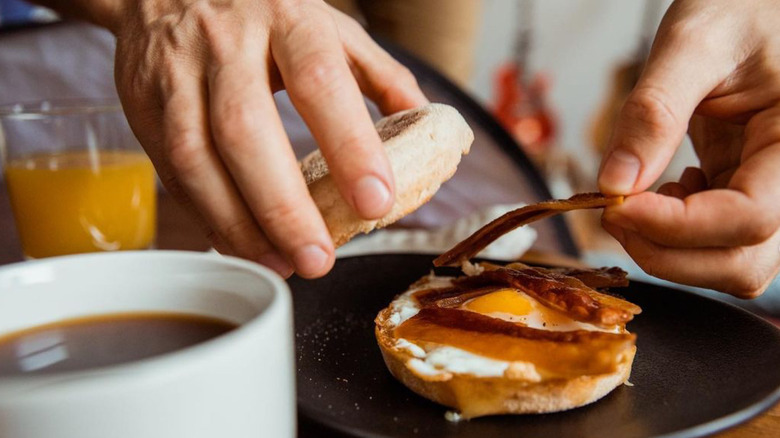Whatever Happened To Umaro Foods After Shark Tank?
We may receive a commission on purchases made from links.
Viewers may remember the appearance of Umaro Foods on "Shark Tank" in spring 2022 based on the product's unique approach to plant-based bacon or the snazzy matching jump-suits worn by the company's founders Beth Zotter and Amanda Stiles. Or maybe what stood out was the face of Shark Robert Herjavec as he spat out the sample of the product presented to him in its raw form. This latter event was definitely not what Zotter and Stiles hoped for in introducing their nascent business on national television in the 18th episode of the 13th season of "Shark Tank," but it did not portend the end of Umaro Foods.
The initial inspiration for Umaro Foods came from Zotter's previous career. Before striking out as a food industry entrepreneur, Zotter had worked in renewable energy. After receiving a grant to research seaweed farms for fuel, Zotter began considering how this plant could also play a role in a more sustainable food system. She sought out the support of Stiles, who has a PhD in plant biochemistry, and they developed "umaro," a seaweed protein powder that can be processed into a bacon-like product with a lighter environmental footprint than its traditional meat counterpart.
Besides Herjavec's less-than-enthusiastic reaction, Umaro Foods was warmly received by the other Sharks, who were among the first people ever to taste their prototype.
What happened to Umaro Foods on Shark Tank?
Umaro Foods is not the world's first plant-based bacon company. From coconut bacon to flattened strips of seitan to the rice paper trick Gordon Ramsey uses as a bacon alternative, home cooks, chefs, and entrepreneurs everywhere have attempted meat-free replacements for this popular American food. In fact, the global demand for vegan bacon increased 5.2% in the four years preceding the Umaro Foods debut on "Shark Tank" (per Future Market Insights). The company's founders, Beth Zotter and Amanda Stiles, were attempting to ride this trend while also leading it in a new direction.
Together, Zotter and Stiles developed an entirely new ingredient to form the foundation of their product made with proteins extracted from red seaweed. From their headquarters in Berkeley, California — a city known for its history of environmental activism — the team at Umaro Foods is motivated by the desire to produce the "most sustainable protein source on the planet."
Several of the Sharks expressed interest in pursuing a partnership with Umaro Foods, but only Kevin O'Leary, Lori Greiner, and Mark Cuban made offers. Ultimately Zotter and Stiles chose to accept Cuban's investment of one million dollars for a 7% stake in the company.
Umaro Foods after Shark Tank
On the heels of their successful pitch to the "Shark Tank" team, Umaro Foods immediately received additional interest from other investors. AgFunder, a venture capital firm focused on innovative agriculture and food technology, lent its support in raising an additional $3 million from a half dozen like-minded entities.
Several months later, Umaro Foods gained further funding from NBA All-Star and entrepreneur, Chris Paul, who reportedly has practiced a vegan diet since 2018. It was around that time that it became possible to eat Umaro Foods' plant-based bacon at restaurants in Denver, Nashville, New York, and San Francisco.
Before appearing on "Shark Tank," Umaro Foods founders Beth Zotter and Amanda Stiles had envisioned three flavors of bacon: original, hickory smoke, and maple bourbon. On the show, they presented just one flavor, the "original," which is designed to mimic the tastes and textures of classic applewood bacon. Just a little over a year later, they launched an additional, unexpected option: black pepper bacon.
Is Umaro Foods still in business?
Umaro Foods' launch on "Shark Tank" proved to be just the first of many victories that have helped the company continue to thrive. In May of 2024, two years after Mark Cuban publicly established a partnership with founders Beth Zotter and Amanda Stiles, Umaro Foods received an additional $3.8 million from a second round of financing with AgFunder.
The success of Umaro Foods hinges on their commitment to making a bacon alternative that is not just eco-friendly, but delicious, too. Zotter and Stiles' product has obvious appeal to vegan eaters and to all people who are looking to incorporate more plant-based ingredients into their daily diets as a means of minimizing their personal impact on the environment. Seaweed plays a positive role in marine ecosystems, such as capturing excess carbon and reducing the acidity of saltwater, and provides plenty of nutritional benefits to humans, including an abundance of vitamins and minerals like vitamin K1, folate, and magnesium.
But as Zotter said during their "Shark Tank" pitch, "None of that really matters unless it tastes good." This is why it has been so important that Umaro Foods has focused on the taste and texture of their product, even going so far as to pursue multiple patents to own their technique for transforming the natural umami, chewy characteristics of seaweed into a salty, crispy strip of something very close to bacon.
What's next for Umaro Foods?
Seaweed is one of the world's fastest-growing organisms, so it seems fitting that Umaro Foods is rapidly growing as a business. In the first five years since its inception, Beth Zotter and Amanda Stiles raised close to $8 million in funding. It is now possible to buy two versions of their product (applewood bacon and black pepper bacon) online for home delivery through Amazon. If you'd rather not cook it for yourself, you're in luck — you can find it on restaurant menus in 250 locations across the U.S., including Choice Market, Roam Burger, Plantega, and Crossroads Kitchen. Zotter and Stiles also intend to expand into catering, including developing partnerships with universities.
In the near future, you may be able to find Umaro Foods products on supermarket shelves. The company aims to launch this next phase on the West Coast, which has led to Umaro Foods being sold in California Whole Foods locations. The brand intends to increase the diversity of its offerings to include things like bacon bits in addition to its latest items, bacon, egg, and cheese breakfast sandwiches. While the classic sandwich is already vegetarian with the meatless-bacon innovation, there is also a 100% plant-based option.
"Shark Tank" is available to purchase on Prime Video.





